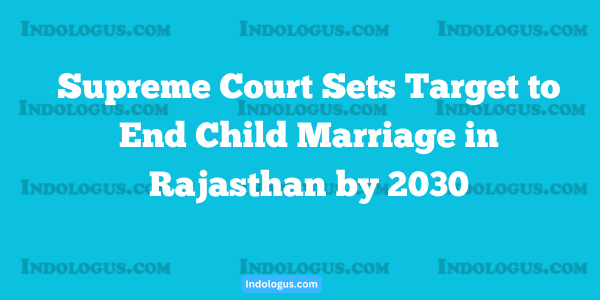Supreme Court’s Determination to Eradicate Child Marriage
In a landmark decision for child protection, the Supreme Court of India has set a target to eliminate child marriage in Rajasthan by 2030. This initiative aims to protect children’s rights, especially those of young girls, and to prevent the harmful impacts of early marriage. The court has directed both state and central authorities to implement rigorous measures to achieve this goal.
Action Plans and Implementation Strategies
The Supreme Court has outlined a comprehensive plan to address the high incidence of child marriage in Rajasthan, particularly in rural and tribal areas. Key actions include:
- Widespread Awareness Campaigns: Educating communities on the legal age of marriage and the harmful effects of child marriage.
- Stronger Law Enforcement: The Rajasthan government is directed to ensure strict enforcement of the Prohibition of Child Marriage Act and other relevant laws.
- Enhanced Coordination: Government agencies, NGOs, and community organizations are to collaborate closely in preventing child marriages.
The court stressed the need for active involvement from local communities and grassroots organizations, as they are essential in educating families and shifting social norms around marriage practices.
Government and Community Collaboration
The Supreme Court emphasized that while government intervention is crucial, true success will also require local and community participation. Community programs, awareness initiatives, and education are vital in empowering families to protect young girls. The ruling encourages partnerships between the government, NGOs, and local leaders to ensure children, especially girls, have access to education rather than early marriage.
Importance of This Initiative
Protecting Children’s Rights
This ruling is a critical step in safeguarding children’s rights in Rajasthan. Child marriage infringes on fundamental rights and can lead to long-term physical and emotional harm. By aiming to eliminate child marriage, the Supreme Court reinforces child protection as a priority within India’s legal and social frameworks. This initiative aligns with India’s commitment to the United Nations Sustainable Development Goal (SDG) of ending child marriage by 2030.
Reducing Social Inequality
Child marriage is often a byproduct of social inequality, disproportionately affecting girls in marginalized communities. This Supreme Court decision targets the reduction of gender-based discrimination, aiming to create equal opportunities for girls in Rajasthan. By promoting education, healthcare, and economic opportunities, the initiative helps create a more inclusive society.
Positive Impact on Future Generations
Eliminating child marriage brings long-term benefits, including improved educational outcomes, reduced maternal mortality rates, and healthier families. By ending child marriage, Rajasthan can drive social transformation, enabling young girls to grow into empowered, educated women who contribute to society and the economy.
Historical Context: Child Marriage and Legal Reforms
Child Marriage in India
Child marriage has been a long-standing issue, particularly in rural and underprivileged areas. Despite the legal age of marriage being set at 18 for girls and 21 for boys, traditional practices persist, especially in states like Rajasthan. According to the National Family Health Survey (NFHS), Rajasthan has one of the highest child marriage rates in India.
Legal Efforts to Combat Child Marriage
The Indian government enacted the Prohibition of Child Marriage Act, 2006, aiming to curb child marriage nationwide. However, enforcement has been inconsistent, and child marriages continue. This Supreme Court ruling signifies a renewed commitment to eradicating child marriage, pushing both state and central governments to take effective action.
Previous Supreme Court Rulings on Child Protection
The Supreme Court has a history of rulings aimed at child protection, including directives against forced child labor and domestic servitude. This new ruling builds on these efforts with a specific goal: to eliminate child marriage in Rajasthan by 2030.
Key Takeaways from the Supreme Court’s 2030 Target to Eliminate Child Marriage in Rajasthan
| S. No. | Key Takeaway |
|---|---|
| 1 | Supreme Court has set a 2030 target for eliminating child marriage in Rajasthan. |
| 2 | Rajasthan has one of India’s highest child marriage rates, particularly in rural and tribal regions. |
| 3 | The state government has been instructed to strengthen law enforcement and launch awareness campaigns. |
| 4 | Enhanced coordination between government bodies, NGOs, and local communities is essential to combat child marriage. |
| 5 | This initiative aligns with India’s commitment to the United Nations’ Sustainable Development Goal of ending child marriage by 2030. |
This Supreme Court initiative is a pivotal step toward creating a future where children in Rajasthan can grow up in safe, empowering environments.




